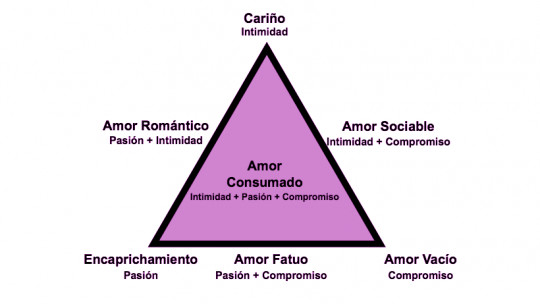We all desire and seek to build a relationship that brings us happiness and allows us to develop as individuals. However, there are different components that we must develop if we want to find that type of ideal love.
To build a healthy relationship, it is crucial to understand that love takes different forms. For example, two people who enter a relationship may be physically attracted to each other but not compatible in other important areas, so it is very likely that if they do not work on them they will experience problems in the future. In this sense, here We will see what consummate love consists of and what it takes to achieve it
What is consummate love?
To better understand the different types of love, psychologist Robert Sternberg developed the triangular theory of love. This framework allows us to understand the type of relationship we have built with our partner; At the same time, it specifies the basic elements of romantic love that we can try to work on to achieve a more satisfactory relationship. Ultimately, this theory allows us to separate superficial feelings of attraction from true love through different criteria.

According to psychologist Robert Sternberg, all romantic relationships are made up of three representative components: passion, commitment and intimacy. The triangular theory of love states that these components are the basis of all love relationships. Consummate love is considered the epitome of romantic feelings, and contains all three components in equal balance
Consummate love represents the highest form of love in intimate relationships, characterized by a deep and enduring bond that encompasses passion, intimacy, and commitment. Coined by psychologist Robert Sternberg, this concept encapsulates the ideal union where partners experience profound emotional connection, intense physical desire, and unwavering dedication to each other’s well-being. In this exploration of consummate love, we delve into its defining features, the factors that contribute to its development, and the keys to nurturing and sustaining it over time.
Defining Consummate Love
Consummate love is often described as the perfect balance of passion, intimacy, and commitment, resulting in a mutually fulfilling and enduring relationship. According to Sternberg’s Triangular Theory of Love, consummate love occurs when all three components – passion, intimacy, and commitment – are present in equal measure. Here’s a breakdown of each component:
- Passion: The intense physical attraction, desire, and arousal that fuel romantic and sexual intimacy between partners.
- Intimacy: The emotional closeness, trust, and connection that foster deep understanding, empathy, and vulnerability in the relationship.
- Commitment: The dedication, loyalty, and determination to maintain the relationship and work through challenges together, regardless of obstacles.
Factors Contributing to Consummate Love
Several factors contribute to the development and sustenance of consummate love in a relationship:
- Compatibility: Shared values, interests, and life goals create a strong foundation for mutual understanding and compatibility, fostering emotional connection and intimacy.
- Communication: Open and honest communication allows partners to express their needs, desires, and concerns, fostering trust, empathy, and intimacy in the relationship.
- Mutual Respect: Respect for each other’s autonomy, boundaries, and individuality cultivates a sense of equality and appreciation, enhancing emotional connection and commitment.
- Shared Experiences: Shared experiences, adventures, and challenges strengthen the bond between partners, creating lasting memories and deepening emotional intimacy.
- Emotional Support: Providing and receiving emotional support during times of joy, sadness, and adversity nurtures intimacy, trust, and resilience in the relationship.
Characteristics of Consummate Love
Consummate love is characterized by several key features that distinguish it from other forms of love:
- Balance : Consummate love involves a harmonious blend of intimacy, passion, and commitment, with each component contributing to the overall quality and stability of the relationship.
- Mutuality : Consummate love is mutual and reciprocal, with both partners actively contributing to the relationship’s growth, fulfillment, and well-being.
- Depth : Consummate love is deep and profound, encompassing a profound emotional connection, intense physical attraction, and unwavering commitment to one another.
- Resilience : Consummate love is resilient and enduring, capable of withstanding challenges, conflicts, and hardships through open communication, compromise, and mutual support.
- Growth : Consummate love fosters personal and relational growth, encouraging partners to evolve, learn, and develop together over time.
Nurturing and Sustaining Consummate Love
While consummate love represents an ideal state, it requires ongoing effort, communication, and mutual investment to nurture and sustain. Here are some keys to cultivating and maintaining consummate love:
- Prioritize Relationship: Make your relationship a priority by dedicating time, attention, and effort to nurture emotional connection, intimacy, and growth together.
- Express Appreciation: Show appreciation and gratitude for your partner’s presence, efforts, and qualities, reinforcing positive feelings and fostering emotional connection.
- Stay Connected: Stay connected with regular communication, quality time together, and meaningful gestures of affection and support that strengthen the bond between partners.
- Manage Conflict: Approach conflict with empathy, understanding, and constructive communication, seeking mutually beneficial resolutions that honor both partners’ needs and perspectives.
- Continue Growing Together: Embrace personal and relational growth by exploring new experiences, learning from challenges, and supporting each other’s individual goals and aspirations.
Components of consummate love
Robert Sternberg’s triangular theory of love was first published in 1988. It aims to elucidate the true nature of romantic relationships. Also, thanks to its conclusions, it can serve as a guide towards true and meaningful love by establishing the acquisition of a mutual commitment. According to Sternberg, consummate love is made up of three significant factors: passion, commitment and intimacy.
1. Privacy
The intimacy comes from sharing our deepest emotions and secrets with someone This is achieved over time; trusting the other, providing emotional support or hugging him when he needs it. Ultimately, intimacy can be described as a feeling of security: it is the sensation of feeling safe in the company of someone. This can only be achieved by sharing genuine, that is, authentic and deep, emotions and feelings.
2. Passion
For Sternberg, passion within a relationship is much more than sexual desire; he defines it as an intense need to be with someone This component can range from feeling excited when the other person comes home from work to thinking about a common future. The feeling of passion also implies wanting to make others as happy as oneself.
3. Commitment
Compromise is the result of two important decisions. First, it involves deciding what you love and care about, and then it involves deciding to continue doing so over the years. This element ends up being established thanks to the promises kept, the other can trust without fear of being wrong that we will always be there, both in the good and bad times, especially in the latter. As we see, this component emerges over time and includes deep feelings of loyalty and trust
As we see, a firm understanding of relationships and their components is crucial when it comes to love. Sternberg thoroughly explains the basis of his findings about consummated love, as well as other types of love, in a detailed framework. Based on the three components of the triangular theory of love: commitment, intimacy and passion. Stenrnberg proposes eight different types of love that arise from their absence or presence.
Love that lacks more than one component, for example, passion and intimacy and only the obligation to be together, is according to Stenrnberg a reduced and basic form of romantic love. If there are two of these three components in the relationship, then it means that it is going in the right direction. However, consummate love – which must be aspired to – requires all three components.
How to achieve consummate love?
Self-assessments, questionnaires, and observations are common methods of researching love. However, love cannot be measured the way we measure palpable things. Love – like other abstract concepts such as emotions – is intangible: it cannot be touched, but we can describe its positive or negative effects.
Several studies that analyzed Sternberg’s triangular theory of love through the lens of different attachment styles , focused on investigating how different types of relationships could predict the level of satisfaction of each of the members involved. They found that relationships with high levels of commitment and intimacy in which there was secure attachment had the highest satisfaction rates.
On the other hand, relationships with secure attachments tend to last longer than those with insecure attachments. These “safe” relationships contain high levels of the components of passion and commitment. Although, a direct correlation was also described between levels of intimacy and the establishment of relationships classified as safe. However, none of this research examined consummated love closely. This is because it takes a significant amount of time for couples to establish this type of relationship
Does love make us happy?
The well-known Harvard Study of Adult Development is a longitudinal study that has examined the lives of more than 2,000 people over time. This began in the state of Boston in 1938 and is still ongoing today. Its longitudinal nature has allowed researchers to discover that one of the keys to happiness is loving relationships.
According to Robert Waldinger, the psychologist in charge of the study, relationships are the key to developing a healthy and happy life. During his well-known TED talk a few years ago, Waldinger explained that the clearest message that could be extracted from the research was that “good relationships keep us healthier and happier.” People who maintain strong social ties are generally happier than people who are alone
Furthermore, enjoying a loving relationship makes people stay healthier. The study shows that middle-aged people who said they were more satisfied with their relationships had better cholesterol readings than those who were in less satisfying relationships.
As we see, there is a strong and positive correlation between love and happiness; so it is worth looking for it. However, perfect love does not happen overnight; This takes time to develop. Also In some cases it may remain for a while and then fade away
To help us develop consummate love we have to explore, together with our partner, the three points of the Sternberg triangle (passion, commitment and intimacy) over an extended period of time. Once these three components are present, love is considered complete and satisfying.
Consummated love today
Social norms regarding romantic relationships have changed dramatically over time. This is because new generations have radically altered the way their parents and grandparents saw and understood love. According to a study carried out in 2017, only 43% of young people between 21 and 36 years old were married; If we go back to the previous generation, 78% of the members had already passed through the altar when they were in that same age range.
However, these facts about marriage do not have a direct relationship with consummated love. A survey conducted among American citizens in 2018 reflected that 64% of participants said they felt happy and satisfied in their romantic relationships As shown through Sternberg’s love triangle theory and various surveys, we could say that today’s young people delay the commitment point of the triangle, a decision that leads them to spend more time with their partner and get to know each other better. before making a long-term commitment. Consciously exploring the different vertices of the triangle is the key to building relationships of consummate love.
Embracing the Essence of Consummate Love
Consummate love represents the pinnacle of intimate relationships, where passion, intimacy, and commitment converge to create a profound and enduring bond between partners. By understanding its defining features, recognizing the factors that contribute to its development, and embracing the keys to nurturing and sustaining it, couples can experience the depth, fulfillment, and resilience of consummate love in their journey together.









